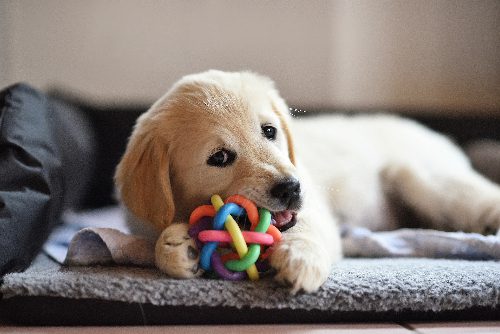We’ve all had those heart-stopping moments when we find our furry friend chewing on something they shouldn’t. Plastic items can be particularly concerning, whether a toy, bag, or bottle. In this guide, brought to you by Fetch Specialty & Emergency Centers, we’ll walk you through the steps to take if your dog has consumed plastic.

Assessing the Situation
First and foremost, try to determine how much and what type of plastic your dog might have consumed. Did they nibble on a plastic toy or swallow a whole plastic bag? Look around for any remnants and check their mouth for any leftover pieces.
Potential Risks and Complications
While some small pieces might pass through without causing harm, larger or sharp-edged pieces can pose risks. These include:
- Intestinal blockage
- Cuts or tears in the digestive tract
- Choking hazards
Immediate Actions to Take
- Remove Any Remaining Plastic: Ensure there’s no more accessible plastic that your dog might consume.
- Check Breathing and Posture: Ensure your dog isn’t choking or showing signs of distress.
- Monitor Behavior: Look out for symptoms like vomiting, loss of appetite, or abdominal pain.
Contact an Emergency Veterinarian
If you believe your dog has swallowed a significant amount of plastic or if they show any signs of distress, it’s crucial to contact your vet or an emergency animal clinic immediately. Fetch Specialty & Emergency Centers professionals can guide the following steps and determine if medical intervention is needed.
Treatment Options
Depending on the situation, the vet might recommend:
- Observation: Monitoring your dog for any signs of complications.
- X-rays: To determine the location and size of the plastic.
- Ultrasound: Some plastic may not be clearly visible on X-rays. Ultrasound can be helpful to determine presence/absence of plastic material and more clearly assess for blockage.
- Surgery or Endoscopy: In severe cases, surgical or endoscopic intervention might be required to remove the plastic. The decision between these two methods is based upon size of material ingested and location in the GI tract. Typically once past the stomach, foreign material has to be removed surgically.
Home Remedies and Care
While it’s essential to consult a vet, some general care tips include:
- Keep Them Hydrated: Ensure your dog has access to fresh water.
- Monitor Their Stool: Check for any plastic pieces that might pass through.
- Limit Physical Activity: Until there are no complications, keeping your dog calm and restricting rigorous activities is a good idea.
The well-being of our pets is always a top priority. If your dog consumes plastic, staying calm, taking immediate action, and seeking professional guidance can make all the difference. Remember, the Fetch Specialty & Emergency Centers experts are always there to help and provide the best care for your beloved pet.
Frequently Asked Questions (FAQs):
Q: What should I do if my dog ate a plastic sandwich bag?
A: Remove any remaining plastic, monitor their behavior, and consult a vet, especially if they show signs of distress, discomfort, vomiting, or inappetence.
Q: How long does it take for a dog to pass plastic?
A: It varies depending on the dog and the size of the plastic. Some pieces of plastic can sit in the stomach for long periods of time before moving on in the GI tract. You may be able to see evidence in the feces as early as 12 hours after eating up to several days. Always consult a vet for guidance.
Q: What happens if my dog accidentally eats plastic?
A: Small pieces might pass without issues, but larger or sharper amounts can cause complications. It’s essential to monitor your dog closely and seek veterinary advice.
Q: What home remedies are there if my dog ate plastic?
A: While there’s no specific “home remedy” for ingested plastic, keeping your dog hydrated and monitoring their behavior is crucial. However, always prioritize professional veterinary advice.
About Us
Fetch Specialty & Emergency Veterinary Centers is a family-owned practice providing elevated specialty care, emergency medicine, and critical care in three convenient locations throughout Florida and South Carolina. Our board-certified veterinarians and highly skilled support staff all share a deep appreciation for pets, people, and the human-animal bond. We recognize how much you love your pet as a part of your family, and that’s why we love what we do!

